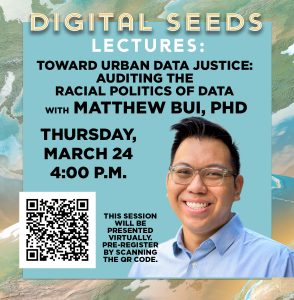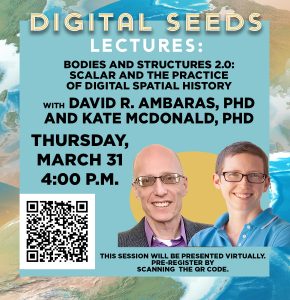Join Falvey Memorial Library for the 2022 Digital Seeds Speaker Series
Join Falvey Memorial Library for the 2022 Digital Seeds Speaker Series. The speaker series provides opportunities for Villanova faculty, staff, and students to learn more about digital scholarship and research at the intersection of social science, humanities computing, and data science. For more on digital scholarship at Falvey Memorial Library click here.
These ACS-approved events, co-sponsored by Falvey Memorial Library and the Albert Lepage Center for History in the Public Interest, are free and open to the public.

Matthew Bui, PhD, on “Toward Urban Data Justice: Auditing the Racial Politics of Data”
Thursday, March 24 at 4:00 p.m. via Zoom
What is the role of (open and big) data in enacting, facilitating, and/or limiting racial justice within an increasingly datafied society? This talk explores the relationship between marginalized communities of color and data, foregrounding questions about power, inequality, and justice.
First, Bui will briefly touch on a study that proposes a typology of community-based engagements with, and disengagements from, data for racial justice: namely, data use, re-use, and refusal. Building on this work and considering the politics of data re-use and refusal to keep powerful actors accountable, Bui will discuss in detail a second longer-term project exploring questions of algorithmic accountability and the predatory nature of data-driven systems: specifically, a study that aims to audit and examine online targeted ads as racially discriminatory by nature.
In all, this work theorizes and conceptualizes “urban data justice” as a community-engaged vision and reparative praxis in response to what Bui and his team are conceptualizing as “algorithmic discrimination”. In all, he asks: how do we tell stories with—and about—data? Who benefits from dominant narratives? How can we subvert unequal power relations within—and of—data? What new methods, frameworks, and language do we need for these endeavors?
Speaker Biography:
Matthew Bui (he/him), PhD, is a postdoctoral researcher and incoming assistant professor (starting Fall 2022) at the University of Michigan School of Information. He also holds faculty affiliations with the UCLA Center for Critical Internet Inquiry and NYU Center for Critical Race and Digital Studies. Bui’s research examines the potential for, and barriers to, urban data justice, foregrounding the racial politics of data-driven technologies, policy, and platforms. He is currently leading a study about racial discrimination and targeted ads and launching a new project that explores how entrepreneurs of color navigate algorithmic bias. His research has received recognition and support from the Annenberg Foundation, Benton Foundation, Democracy F¬¬und, and Kauffman Foundation; and the International Association for Media and Communication Research (IAMCR) and Research Conference on Communications, Information and Internet Policy (TPRC).
Previously, Bui was a Provost’s Postdoctoral Fellow at the NYU Alliance for Public Interest Tech and received his PhD from the Annenberg School for Communication at the University of Southern California. He also holds graduate certification in geographic information science, an MSc in Media and Communication Research from the London School of Economics, and a bachelor’s degree in Communication from the University of California, Los Angeles (UCLA).
 David R. Ambaras, PhD, and Kate McDonald, PhD on “Bodies and Structures 2.0: Scalar and the Practice of Digital Spatial History”
David R. Ambaras, PhD, and Kate McDonald, PhD on “Bodies and Structures 2.0: Scalar and the Practice of Digital Spatial History”
Thursday, March 31 at 4:00 p.m. via Zoom
The fundamental intervention of spatial humanistic scholarship is the notion that space is multi-vocal — that places are made up of layers of meaning and history; that layers of place produce distinct geographic footprints and sets of spatial relationships; and that one’s social-historical positionality or “body” shapes how one encounters particular spatial “structures.” Launched in 2021, Bodies and Structures 2.0 examines the dynamics of place- and space-making in modern East Asia. In this presentation, we will discuss how we developed Bodies and Structures 2.0’s unique combination of individually-authored modules and collectively-curated conceptual maps and visualizations and how we used the open-source Scalar platform to build our multivocal project.
Speakers’ Biographies:
Kate McDonald, PhD, is Associate Professor of Modern Japanese History at the University of California, Santa Barbara and co-director of the Bodies and Structures: Deep-Mapping Modern East Asian History project. She is the author of Placing Empire: Travel and the Social Imagination in Imperial Japan (California, 2017) and currently serves as the Associate Editor for Japan at the Journal of Asian Studies.
David Ambaras, PhD, is a Professor of History at North Carolina State University. His research explores the social history of modern Japan and its empire, particularly through a focus on transgression and marginality. He is the author of Japan’s Imperial Underworlds: Intimate Encounters at the Borders of Empire (Cambridge University Press, 2018); Bad Youth: Juvenile Delinquency and the Politics of Everyday Life in Modern Japan (University of California Press, 2006); and articles and book chapters on class formation, urban space, wartime mobilization, and ethnic intermarriage. He is the co-director of the digital project Bodies and Structures: Deep-mapping Modern East Asian History. Ambaras holds a PhD from Princeton University, and degrees from the University of Tokyo, the Institut National des Langues et Civilisations Orientales (Paris), and Columbia University. He is recipient of fellowships from the National Humanities Center and the National Endowment for the Humanities.
Feel free to reach out to Erica Hayes, Digital Scholarship Librarian, with any questions you might have!
0 Comments »
No comments yet.
RSS feed for comments on this post. TrackBack URI